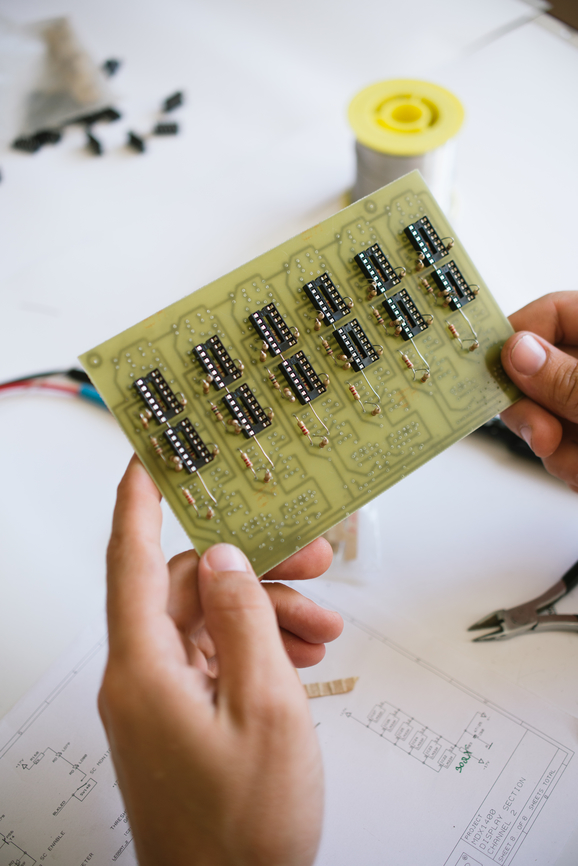Photo by Montes-Bradley via Getty Images
This July, six Afghan girls were supposed to be in Washington, DC, competing in an "Olympics-style" robotics competition that brought together teams from around the world. Instead, they'll be Skyping in to see how their ball-sorting robot does in the inaugural FIRST Global Challenge because they were denied travel visas to enter the US.Care2, a social networking website focused on social justice, has launched an online petition asking Secretary of State Rex Tillerson to step in and grant these girls visas. As of press time, the petition was creeping up on its goal of 25,000 signatures."These girls are not a security threat to the United States," the petition reads, "and in fact Afghanistan is not even one of the Muslim countries included in the Trump Travel Ban."It's unclear why the Afghan team wasn't granted permission to enter the US. According to Forbes, the teenage girls traveled 500 miles across Afghanistan to the US Embassy in Kabul, a city targeted by recent suicide attacks, to interview for their visas. Despite the threat of violence, they traveled to Kabul a second time for another round of interviews, yet were denied again. Fatemah Qaderyan, a 14-year-old member of the team, told Reuters: "No one knows about the future but … We did our best and we hope that our robot could get a position along other robots from other countries."Her teammate, 17-year-old Lida Azizi, was less diplomatic. "All of the countries can participate in the competitions, but we can't," she said. "So it's a clear insult for the people of Afghanistan."According to statistics garnered by the National Girls Collaborative Project, only one in 10 minority women are employed scientists and engineers. While there has been increases in ethnic and minority representation in the STEM fields over the past two decades, in 2013, 70 percent of workers in science and engineering occupations were white.
Fatemah Qaderyan, a 14-year-old member of the team, told Reuters: "No one knows about the future but … We did our best and we hope that our robot could get a position along other robots from other countries."Her teammate, 17-year-old Lida Azizi, was less diplomatic. "All of the countries can participate in the competitions, but we can't," she said. "So it's a clear insult for the people of Afghanistan."According to statistics garnered by the National Girls Collaborative Project, only one in 10 minority women are employed scientists and engineers. While there has been increases in ethnic and minority representation in the STEM fields over the past two decades, in 2013, 70 percent of workers in science and engineering occupations were white.
Advertisement
The travel ban alluded to on Care2's petition went into effect a week ago after the Supreme Court lifted parts of it until the justices can hear arguments later this year; it applies to Iran, Libya, Syria, Somalia, Sudan, and Yemen. According to Joe Sestak, president of FIRST Global, out of 164 teams scheduled to compete in the event, 156 have already received approval to participate, including teams from Iran and Sudan, plus a group of Syrian refugees. Six teams await their visa decisions; Gambia was the only other country to be denied alongside Afghanistan."I was going to be so proud when I watched these young, brave Muslim girls lead the 164 nations' teams into Constitution Hall, the Hall of 'We the People' here in America," Sestak wrote on Facebook. "And yet I know that the team was given a fair opportunity, a very fair opportunity, by the U.S. State Department."Read more: Women Who Put Their Careers First Just As Unlikely to Get Jobs in STEM Fields
Advertisement

"There's a saying: 'You can't be what you can't see,'" says Julie Mastrine, manager of brand marketing and PR at Care2. "While women make up half of the US college-educated workforce, they make up just 29 percent of science and engineering workforce. I imagine we would see a similar gender disparity at this robotics competition, so having these girls be there [at the competition] would send a message that, yes, engineers do sometimes look like women.""Those who have signed the Care2 petition," Mastrine continues, "believe what we're losing is a chance to show girls, and in particular Middle Eastern girls and women of color worldwide, that they do have a place in the STEM fields. That when they work hard and are creative, they'll be recognized, rewarded and seen. We're losing a huge opportunity to show girls that they have a place in shaping the future of science and engineering."
